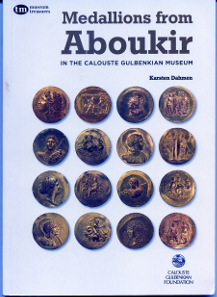by Ursula Kampmann
March 27, 2014 – Not many private coin collections formed at the beginning of the twentieth century have survived. This epoch was incredible. At that time a collector only needed enough money to purchase important rarities. The Calouste Gulbenkian Foundation has the immense luck to keep one of these collections. A portion of this treasure is constituted of eleven of the medallions from the Aboukir hoard which means that more than half of all of these medallions are in Lisbon. In the whole world only 20 of them still exist!
Karsten Dahmen, Medallions from Aboukir in the Calouste Gulbenkian Museum. Calouste Gulbenkian Foundation, 2013. Paperback, 21 x 15 cm. ISBN: 978-972-8848-91-0. 7.20 euros.
Today, we explain these enigmatic objects as prize money from the time of the Roman emperor Caracalla. They were probably handed out to the winners of the Games of Beroia by the magistrate of the koinon of Macedonia. This suggestion is based not only on the likeness between the medallions and Macedonian bronze coins from the beginning of the third century but also because these pieces do not match any currency system at all.
For writing this second volume in their ‘Museum Treasures’ series the Gulbenkian Foundation was able to engage Karsten Dahmen who previously had worked extensively on that subject. First, Dahmen describes how Gulbenkian came in possession of the objects: eight of them were bought from the heirs of the late John Pierpot Morgan, three came from the James Loeb collection. Then he moves on to the central topic of the medallions: Alexander. The Games in Beroia organised by the koinon of Macedonia were celebrated in Alexander’s honour and are treated in detail in the following chapter.
Next follows the catalogue of the eleven pieces. Every single of these gorgeous objects receives a detailed description and interpretation. In addition there are images of coins whose motifs are connected with the medallions. In order to complement this presentation the other known medallions – five are kept in Berlin, three in Baltimore, one in Thessaloniki – are also shown. A bibliography completes the remarks and in the second part the English version is translated into Portuguese.
You can buy the booklet on the internet. However, probably the postal charges will cost more than the booklet itself which is charged at only 7.20 euros.
But, on the other hand, that may be an excellent reason to travel to Lisbon in person and take a look at the original medallions in the Calouste Gulbenkian Museum.





